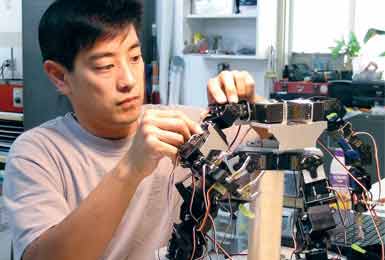New Vocationalism: The Way to a Winning Work Force?
April 2012

Labor Market Deficits
The U.S. Bureau of Labor Statistics reported in March that manufacturing employment rose by 31,000 in February, but the sector was held back by a shortage of skilled labor. A recent survey of American manufacturers by Deloitte Consulting LLP found 5 percent of manufacturing jobs - 600,000 nationwide - were going unfilled because industrial firms couldn't find workers with the right skills, even with national unemployment rate above 9 percent.
Business/education partnerships grow out of market deficits like those noted in the Deloitte study. In Newport News, Virginia, for example, Northrop Grumman needed a steady supply of skilled welders, maintenance technicians, and engineers. The company partners its Apprentice School of Shipbuilding with area community colleges such as Tidewater and Thomas Nelson. Northrop has developed articulation agreements with area colleges so credits earned in the apprentice school count toward Associate's and Bachelor's degrees in the colleges. In turn, the company provides qualified college students full tuition to take computer-aided design and mechanical engineering courses, and then employs them upon graduation at middle-income starting salaries.
Increase in College/Business Collaborations
While colleges may view too tight a bond with business as subverting their mission of providing well-rounded education, they are also facing significant declines in state and federal funding. Illinois State University's report on higher education funding shows a 7.6 percent decline nationally in state support from 2011 to 2012, with 29 states appropriating less than they did five years ago. Declining government support may translate into more college/business collaborations, where schools accept more corporate support in return for delivering ready-to-go workers. The academic budget crunch provides an opportunity for companies willing to partner with area schools.
One of those is RobotWorx, an Ohio robot integrator and re-manufacturer. Owner Keith Wanner estimates that within 200 miles of his Marion, Ohio, plant lies 85 percent of the U.S. industrial robot market. He notes, however, a dearth of training for robot techs and engineers. Honda's Ohio plants are 30 minutes away. Many more automotive assembly and supplier plants are scattered throughout Ohio, Indiana, Kentucky, and Michigan. "They're crying for qualified robot technicians," says Wanner.
Recognizing the need, in true "new vocational" fashion, Wanner has started conversations with three local schools. The regional campus of Ohio State University, Marion Technical College, and Tri-Rivers Career Center are now developing an industrial robotics and automation training center. With equipment donated by RobotWorx, Fanuc, and others, the center will be operational by this fall, utilized by each school in its technical and engineering courses. Students will have co-op opportunities with member companies and a pathway up the educational ladder toward a four-year engineering degree - or they can jump off with a certificate or Associate's degree and go to work.
Project Announcements
Wyandot Snacks Expands Marion, Ohio, Production Operations
08/29/2025
Trane Technologies Expands Fort Smith, Arkansas, Operations
08/29/2025
BioMADE Plans Boone, Iowa, Bioindustrial Manufacturing Operations
08/29/2025
Choice Fabricators Expands Rainbow City, Alabama, Production Operations
08/29/2025
Ranovus Expands Ottawa, Ontario, Semiconductor Operations
08/29/2025
Belgium-Based Stow Group Plans Gordon County, Georgia, Manufacturing Operations
08/28/2025
Most Read
-
Tariffs, Talent, and U.S. Expansion
Q3 2025
-
What We’re Getting Wrong About Gen Z’s Future in the Skilled Trades
Q3 2025
-
Data Center Demand Stabilizes Amid Changing Market Forces
Q3 2025
-
A New Course for U.S. Shipbuilding
Q3 2025
-
Optimizing Your Rail-Served Transportation Network: Strategy Before Steel
Q2 2025
-
In Focus: AI Is Changing Incentives Math
Q2 2025
-
Rewriting the Rules of Warehouse ROI
Q3 2025


